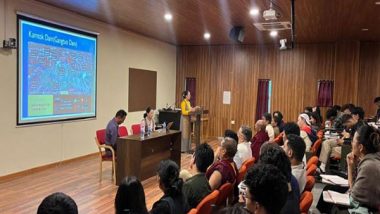Bengaluru (Karnataka) [India], October 21 (ANI): The Dalai Lama Institute for Higher Education (DLIHE) and the Department of Information and International Relations (DIIR), Central Tibetan Administration hosted a panel discussion titled 'Why Tibet Matters' at the institute's Aa-Ka-Ma auditorium.
The panelists engaged in a robust dialogue on Tibetan identity and rights, exploring the multifaceted challenges faced by the Tibetan community in the current political climate.
The event was moderated by Acharya Norbu, a lecturer in Tibetan History, and featured two panellists -- Dechen Palmo, an environmental researcher at the Tibet Policy Institute, and Dukthen Kyi, head of the Tibet Advocacy Section at DIIR.
During the discussion, Dukthen Kyi highlighted the political and cultural importance of protecting Tibetan identity amid increasing pressures from the Chinese government. She outlined the Central Tibetan Administration's efforts to advocate for Tibetan rights and called for heightened international awareness and support for the Tibetan cause, linking environmental sustainability with human rights.
The panel concluded with a call to action, urging participants to engage in advocacy for Tibet's critical issues. DLIHE's Principal, Tenzin Pasang, reinforced this message, emphasising the collective responsibility of attendees to support the Tibetan movement. The event, attended by nearly 200 students and faculty, fostered dialogue and community among those invested in the Tibetan cause.
The Tibetan issue involves political, cultural, and human rights concerns related to Tibet, a region known for its unique culture and spiritual traditions.
After China invaded Tibet in 1950, it was incorporated into the People's Republic of China, changing its governance and society. Many Tibetans, including the Dalai Lama, seek greater autonomy or independence due to worries about cultural loss, religious repression, and human rights violations.
The Chinese government insists that Tibet is part of China and promotes economic development in the region. This has led to ongoing international discussions and activism for Tibet's cultural preservation and the rights of its people, making the issue a sensitive topic in international relations.
In recent years, there have been several notable cases that highlight ongoing concerns. For instance, the Chinese government's intensified crackdown on Tibetan Buddhism, including the restriction of religious practices and the surveillance of monasteries, has drawn international attention.
The situation surrounding the Panchen Lama, a key figure in Tibetan Buddhism, is particularly poignant. Kidnapped by Chinese authorities in 1995 at the age of six, he has not been seen publicly since, raising fears about religious freedom and the future of Tibetan spirituality. (ANI)
(This is an unedited and auto-generated story from Syndicated News feed, LatestLY Staff may not have modified or edited the content body)













 Quickly
Quickly

















